Ahoy, squirts! Quint here.
There are some people who are just plain intimidating to talk to. I’ve had my share of nervous chats, some because of the sheer intelligence of the person I’m speaking with, some due to overwhelming fanboyism on my part. David Fincher is a person that fully covers both areas of trepidation.
This is my second time around with Mr. Fincher (if you don’t count the three question email interview I did with him after seeing The Social Network early). I was quite proud of my first chat with the man, where we discussed Zodiac and I had a lot to bring to the table with some interesting personal history involving my mother and one of the prime Zodiac suspects at one time. No shit.
I highly suggest wading through the mangled version of that old interview… I say mangled because in the quick redesign most of the archive coding makes it look funky. You can still read it without much difficulty, just weird spacing and random bolds. Click here to read.
I don’t know if I could have topped that interview as we got to cover a lot more ground… from his beginnings at ILM to the troubles of Alien 3 and on through to Zodiac… but I don’t feel I totally flubbed this one.
There’s some great stuff in here, from Fincher’s feeling on honesty in supplemental materials, how the regatta is NOT tilt-shift photography and the current status of the animated feature of the great cult comic The Goon that he’s producing. Hope you guys enjoy the chat!
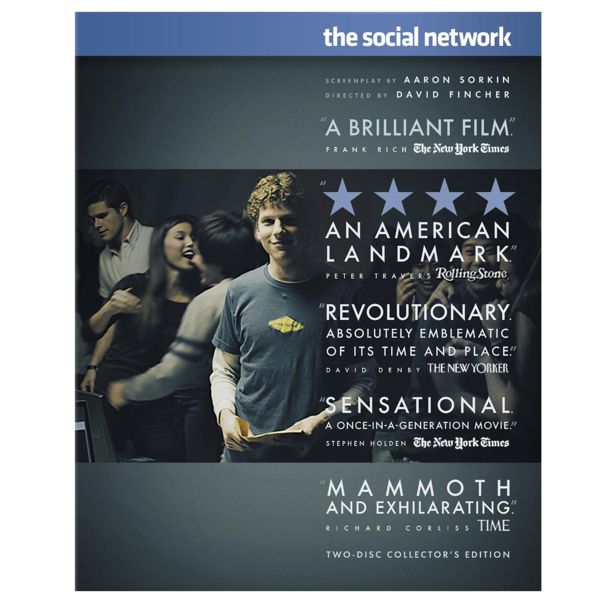
David Fincher: Hey, Eric. How are you?
Quint: I’m fantastic. Thanks for taking the time to talk to me, man. I appreciate it.
David Fincher: No problem. I’m starting to feel like Clifford Irving, though. I really want to stop talking about this movie.
Quint: (laughs) Hopefully this isn’t too much of a chore, then. I also wanted to thank you for having me out to that early screening. It was great seeing it before all the hype and the advertising blast.
David Fincher: Yeah, well I really meant it. I think there could be discourse between the film and blogosphere. It isn’t just about “the scoop,” do you know what I mean? I think there’s headway to be made in actually helping to build a bridge between what we are trying to do and the people we want to go see it.
Quint: You guys certainly picked the right crowd, the internet generation…
David Fincher: Well… Not to take anything away from Scott Rudin, who does a really good job with all that stuff, I think the thing is if you put the movie in front of the people who are going to understand, as opposed to the people who aren’t going to understand it or are going to be threatened by it or whatever. You can’t take a movie that has this much talk and preview it for the same people who like Indiana Jones movies. It’s just a different kind of thing.
It’s far less calculated, I think, than anybody gives us credit for. It’s more about us going, “Well, who’s going to appreciate it? Who is going to understand the notion of this kind of start-up?” A lot of people don’t see people sitting front of computers typing as inventors or creators, you know? I think it’s an important distinction. You’ve got to frame the conversation properly.
And I do think it’s the kind of movie that has a conversation. I don’t think it’s the kind of movie that wins on momentum or spectacle. (laughs) It doesn’t have any of that going for it.
Quint: The spectacle is all in Aaron Sorkin’s fantastic dialogue and the performances you got out of your actors.
David Fincher: Yeah! All I’m saying is that I think there were a lot of people who thought “Oh, look at the people who were hand picked!” No, it’s nothing as calculated as that.
Quint: Well, I love the movie. I’ve seen it many times now thanks to the awards screeners and they sent me…
David Fincher: They send you awards screeners? Or are you part of the Academy? (laughs)
Quint: No, no. I’m a member of the Austin Film Critics Association, so I get For Your Consideration screeners.
David Fincher: Oh, that’s right! We were bypassed by them, I believe!
Quint: (laughs) Yep, we gave it to Black Swan, but if it means anything The Social Network was my number one, so you had my vote!
David Fincher: (laughs) I liked Black Swan.
Quint: Yeah, it’s a good flick.
David Fincher: To me the notion that there’s one movie at the end of the year that is “the best movie” is kind of an absurd notion. I mean, it’s “the movie of the year” for Tuesday nights and “the movie of the year” for Friday nights, you know what I mean? Let’s hope that movies are something more than just theme park rides. Let’s hope that movies are a part of our cultural relevance and more akin to literature than to music. I hope the movies aren’t as disposable as contemporary hit radio would like to make music.
Quint: This year in particular seems to be really strong in terms of more adult fare.
David Fincher: I hope you’re right. I honestly haven’t seen many movies this year. Literally I was working 16 hours a day then turned the print over, went to the New York Film Festival and then got on a plane and started shooting the next day in Sweden, so I haven’t seen enough. But it always depends on who you talk to. There are people who always bitch about “This is a weak year for movies,” and you have other people who say “Oh, my God. How can you be so wrong?”
Quint: Have you seen True Grit yet?
David Fincher: I haven’t.
Quint: True Grit is up there for me. But you have that movie, Social Network, Black Swan… you have all these great movies that have a lot on their minds, but also aren’t preachy. Usually when you get to the end of the year the Oscar bait movies come out…
David Fincher: And they’re “about” something.
Quint: Yeah. They’re really trying to hammer a point home, whereas those movies I listed could easily just be watched for the entertainment value if that’s all you wanted out of them.
David Fincher: Right.
Quint: Just last week I was sent an early version of the DVD, so I watched the documentaries and listened to the commentaries…
David Fincher: Oh, yeah? How is it?
Quint: It’s actually really good! I know it sounds like I’m surprised, but… I collect Blu-Rays and DVDs fanatically, I’m almost OCD about it, I have thousands, so I’ve watched a lot of special features, listened to a lot of commentaries and I was shocked a little by the honesty on display on The Social Network DVD. I mean, almost every time Jesse (Eisenberg) opened his mouth he was talking about a scene he thought he fucked up or his shrink or describing a day where he had trouble with his anti-depressant medication.
David Fincher: (laughs)
Quint: And you had a moment where you were very open on how difficult Harvard was to deal with.
David Fincher: Well, in their defense they were pretty upfront about it. They were like, “There’s no chance we’re helping you, but do submit all your materials.” It’s that whole thing of… you’re hoping you’ll be the one that makes them see the light. “I can fix this woman!”
Quint: The Chasing Amy syndrome!
David Fincher: Exactly. Look, we had a lot of Harvard grads on our side, helping us make our case, and we were hoping that would sway them, but in the end I don’t think they were ever intending to (work with us).
Which is weird because they show Love Story every year, some weird sort of badge of honor, but that’s the reason why they won’t let you shoot there anymore. “Oh, they killed a tree on Love Story.” It’s like, “Well, we’ll hire an arborist to stay with us the entire time!”
Quint: It’s not just the Harvard stuff, but there was a real depth to the making ofs that didn’t feel like everybody just repeating how great everything was all the time.
David Fincher: That’s like EPK (Electronic Press Kit) stuff. Honestly… So few actors that I would want to hear from want to be a part of that because it’s just another sales tool. You go, “Let’s not.” I always find the stuff that makes me intrigued about how movies get made was when you hear people talk about how they didn’t get what they wanted, but it ended up being more interesting. I find that’s the most valuable learning stuff.
Quint: Some of my favorite stuff in all the footage was the early rehearsals, which came off more like a script meeting with you, Jesse, Andrew Garfield and Aaron (Sorkin).
David Fincher: Well, that’s kind of what our rehearsals were like just because it was such a dense script. But I also don’t want anybody to be bored and a lot of these guys in the auditions had to read these scenes. They probably had to audition three, four, five times, so the big scenes in the movie we had already been through many, many, many times. So, it was more about making sure everybody knew what the intent was.
Quint: Yeah, but it was being able to watch the details solidify. From an outside perspective, that’s the kind of stuff you don’t see. You don’t see the back and forth, where you have Aaron who may be a little more protective of the work…
David Fincher: Foolishly. (laughs)
Quint: Haha, yeah. But at the same time open to thoughts of the actors and from you. I love seeing the collaboration. So much of the EPK stuff you mentioned is just about who is the most famous person there and how much fun they had.
David Fincher: Say nothing, obfuscate. I hate that. We don’t even allow EPK people on the set.
Quint: How did you bring these guys into the fold? You must trust them if they had such intimate access to the process.
David Fincher: Well, David Prior I’ve worked with since… I guess it was Fight Club, so it’s been 10 years. He’s a film director in his own right. He’s just one of these people who has done so many of these and has such an affinity to where this medium can go… And he’s in it for the same things. Hopefully you can put together a collection of Blu-Rays and DVDs and listen to the commentary and actually get an introduction to film directing or at least some kind of idea of what people have to go through, comprises they have to make and things they are thinking of that get redirected in some way.
You know, like I was really hell bent on shooting at Harvard because it was going to make my life so much easier. Every location in the script, every location that (Ben) Mezrich was talking about was all five blocks from each other!
If we shot on location at Harvard we probably could have made this movie in six weeks! But it was, “No, you’ve got to shoot at Johns Hopkins for the exteriors.” It ended up being so much more complicated because we couldn’t be in one place shooting it all. Granted, Harvard’s a big business, it’s not just an amazing institution of higher learning.
And this is one thing I never got into the movie, but I really wanted to was you drive past The Coop and you see all those Harvard sweatshirts and all the Harvard sweatpants and all the Harvard cups and all the Harvard mousepads and the Harvard visors and you go, “Wow! It’s beyond an institution, it’s a brand.”
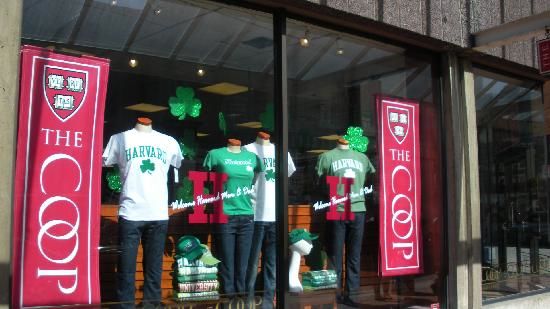
Quint: Sounds almost fanatical.
David Fincher: Yeah, exactly. So, that was definitely one of the things we wanted: we wanted in his run at the beginning for him to go past The Coop, but it didn’t make sense to. It would have been way out of his way.
Quint: One of the things I love so much about a good making of is seeing some of the magic crafted. For instance one of the only shots of Harvard you have, that you shot with…
David Fincher: The three cameras, yeah.
Quint: Yeah, the three cameras that were mounted next to each other and ended up shooting a big panoramic shot that had enough resolution that you could later go in and do whatever camera move you wanted digitally. That’s an invisible trick and I love finding out I’ve been duped!
David Fincher: The idea was it was going to be the kind of thing that required a real precision and we only had 15-20 minutes to get that shot. Our permit was only for an hour and a half or two hours, so we had to put the lights up, get it all ready and then we had to move on. I think we were doing one of the final clubs that night. I think we were doing the fuck bus driving up to the Phoenix, or actually it was the Spee Club we shot at.
So, we had to get out of there and I was like, “I could shoot this for a year!” You know, with tilting off the sky and finding him and keeping him just so, in the center of the frame. I was like, “This is going to drive everybody crazy if we have to do this for real.”
So we just came up with this idea at the last minute of tiling it together. It’s just the kind of thing you can do in this day and age that you couldn’t do ten years ago.
Quint: It works and I never would have known that if I hadn’t seen it in the making of. I also love that you hired a mime to carry a light inside the Harvard archway because you weren’t allowed to put any equipment in there.
David Fincher: Oh, good. They kept that! Good.
Quint: I loved that. It almost makes moviemaking feel like a traveling gypsy show, if you know what I mean.
David Fincher: It is. It’s a circus.
Quint: Another thing I’m really happy that we got to see a little of is the Tyler and Cameron Winklevoss tech, which is flawless in the movie. At that first screening, we all had no idea that was an effect. We weren’t familiar with Armie (Hammer) as an actor, so it wasn’t until after that somebody asked the publicist where you found the twins…
David Fincher: (laughs)
Quint: When I interviewed Armie he talked a lot about Josh Pence playing Tyler Winklevoss and how much he brought to the relationship between the two brothers, but you never really know how much of that is him being a nice guy and wanting to protect Josh’s feelings. But then you see the making of and it’s clear how much he brought to the movie and it wasn’t just Armie being political.
David Fincher: Oh, no. He’s over the shoulder most of the movie. One of the reasons that Armie was able to be as good as he is was because he could just toss Tyler over to Josh and then basically look at it and go, “What is he doing?” The three of us would sit together and go, “I love this!” Or, “Can you do this so I can jump in here, I want to overlap this a little more.” It was like the famed Phil Jackson triangle offense! Everybody sort of threw in, taking some of it off of Armie’s plate.
The thing about Josh is he has this really amazing instinct, like physical instinct. I don’t know if that’s from doing as much modeling as he has, but it was really astounding.
Quint: And you see so clearly how much he informed the character, how he was more than just a stand-in.
David Fincher: He deserves that.

Quint: I think a lot of geeks will enjoy the Winklevoss section because of the technical side of pulling off the twins; seeing what was greenscreened, what was face mapping and all that stuff. The kid in me who loved magic tricks, who read those movie magazines loved that aspect of the making of.
David Fincher: My roommate when I was a teenager working at Lucasfilm was a guy named Craig Barron, who is a great visual effects supervisor in his own right, and he, I think, always had the right idea, which is you don’t want to do just one thing because then the audience starts to look for that one thing. You want to use split-screens, you want to use doubles, you want to use face replacement… You want to change it up so they don’t get used to looking at the same gag over and over.
Quint: I think especially in this case, where the audience didn’t know to look for an effect in the first place, so it had to be invisible.
David Fincher: That’s how it’s supposed to be!
Quint: Another thing I’d love to touch on if we still have some time is what Trent Reznor and Atticus Ross brought to the movie. Their work is one of my favorite scores of the year…
David Fincher: Oh, good! I loved it.
Quint: It’s absolutely incredible. And I particularly loved that for one segment of the film your direction to them was to go for a Wendy Carlos feel.
David Fincher: That was just trying to get Hall of the Mountain King into it. We were trying to go, “How do we reconcile this into an oddly synthetic score?” We just had to make it our own.
Quint: They were saying that was the hardest thing they had to do on the movie!
David Fincher: I know! I thought I was doing them a favor by going, “Look, I know you guys have written all this great stuff… Let’s do an homage to an Edwardian garden party and we’ll pick a well known Edwardian track and it’ll make your lives so much easier!” I think they probably spent more time on that than they did for the rest of the score.
Quint: It’s a fantastic cue and it brings so much energy to the movie right when it needs it. It’s a great compliment to the way you shot it. That was tilt shift photography, right?
David Fincher: No. No. You can’t do a tilting lens board kind of stuff on boat mounts. It was all splits. We could only have 12 camera positions at Henley, so all of the close ups of them was shot without the 250,000 people that come to Henley and line the shores, so we had to add all that stuff in later. I mean, we had eleven or thirteen days from the time we shot the material at Henley to when we had to lock picture.
So, we had to find a length and dramatic piece of music that we could slug in and go, “Okay, our scene is going to be a minute and forty-four seconds” or whatever. Then we went out and shot the material and cut the material to that piece of music, which we already agreed on so we had the dramatic structure of the thing. We had to go and collect the pieces.
When you see the guys rowing and all the stuff that is going by on the banks on either side of the boats, those are all still photographs of people at Henley. We went out and took 3,000 pictures of people with parasols and people in striped suits. We didn’t have the time to shoot it motion picture, we just had a bunch of stills.
So, I said “If we make focus very, very shallow then we’ll get away with stills in the background. Just track the stills in behind and roto(scope) the people out of the foreground.”
We shot… I think the most wide open we got was like a 2 or 2.3. We never got down to a 1.3, which is what we were sort of trying to do. But in the end it turned out to be okay because we could just take it and exaggerate the degree to which it was out of focus, later.
Quint: Have you gotten the tilt shift speculation a lot?
David Fincher: Yeah, I mean there’s a lot of would-be know-it-alls.
Quint: (laughs) And now I’m in the would-be know-it-all camp!
David Fincher: (laughs) No, that’s a way of doing it and that’s certainly the way you would have had to have done it before Photoshop. Like, Z-depth; that stuff is readily available. And in the end the degree to which it is done well… that’s obviously the key to it.
They made so any mattes, thousands of frames of mattes had to be generated for it because in the wide shots, from the grandstands, we had the real race going one, which was probably two four-man boats instead of the eight-man boats. So, to get the crowds in we had to shoot a race that was actually taking place.
And then when our race came up because it was fake and bogus everybody left the stands. They all went out and had caviar and champagne or whatever they have… oh, Pimm’s Cup!
Then we had to strip our boats into the plates where the crowd was. So, you had to shoot one version of the race with the actual racers that didn’t match our boats at all and then we’d shoot our boats in the midst of the race, but everybody would be leaving. Then you’d take those plates and split them together. The only way to really make that work was to make the backgrounds out of focus.
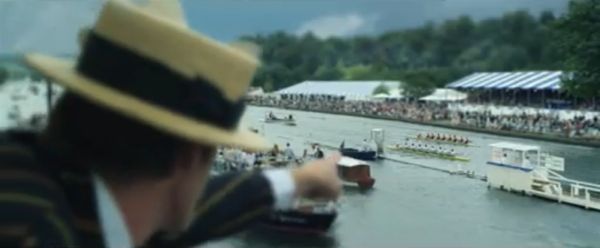
Quint: Well, however you achieved it it’s a great sequence.
David Fincher: I liked it. I was happy with the way it came out.
Quint: And it’s a fun moment, completely separate from the rest of the movie.
David Fincher: It’s weird dramatically. I was sort of pissed off at Aaron because I was like, “Dude! You’re dropping me into the middle of a scene. I don’t know where I am, I don’t what the importance of Henley is, the Winklevi haven’t been talking about Henley, I don’t know what it is to finally be at Henley and it’s not like I even see the start of the race! You’re dropping me into this race I don’t care or know anything about!”
He was like, “Yeah, but it’s really just about getting them to find out that Facebook has gone international.” So I was like, “Okay.”
Quint: There were reports that Mark Zuckerberg actually saw the film. Have you heard anything about that at all?
David Fincher: Nope. No.
Quint: Have you heard from anybody else that was portrayed in the film?
David Fincher: We met Tyler and Cameron. I met Divya at the Harvard Club party and they were really sweet. But again I always felt if we were doing our jobs we would probably be disowned by everyone. We didn’t make this movie to make friends. (laughs) We made this movie because the script was so good.
Quint: Your approach to this material seemed to be more like how you’d approach a Shakespearean play and not as much concerned with the real life…
David Fincher: We’re concerned… You know, I don’t want to be involved in character assassination. You just have to be responsible to the humanity. I know a lot of those situations, I’ve been through a lot of those situations… certainly not with the kind of numbers involved that Facebook is, but I know those are disappointing times when you partner for all the right reasons with people that you want, at that time in your life, to be partners with and for whatever reasons it doesn’t work out. It can be very brutal, those divisions, and how people go their separate ways.
I wanted to be respectful to that. I never saw the story as being “what an asshole Mark Zuckerberg was to Eduardo Saverin.” It was very clear to me that Eduardo should have gone to Palo Alto. If he was really going to be that guy, he should have gone to Palo Alto.
Anyway, hopefully the movie has all those facets to it because I never wanted it to be as simple as “how mean (Mark) is.”
Quint: One thing I wanted to touch on before we wrap this up is The Goon movie. Can you give me an update on that?
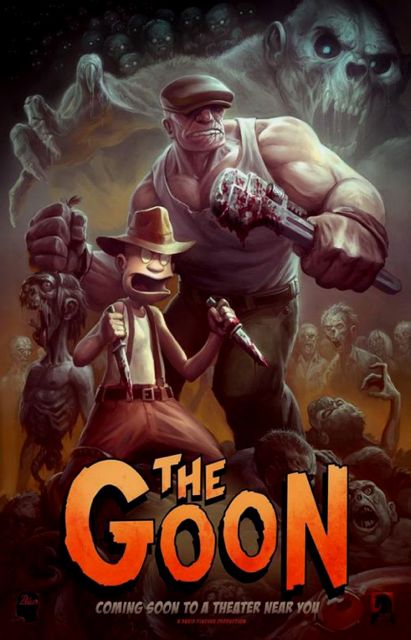
David Fincher: Animation that isn’t singing furry animals is hard. Especially something as outré as Eric Powell. And it’s his script! (laughs) It’s main-lined Eric Powell. We kind of went out with it at the end of the year and I don’t know that a lot of people were paying attention, but hopefully someone will step in and want to (pick it up).
I gotta hope there are more avenues for animation than… I certainly wouldn’t call The Goon “adult animation.” I think that ends up starting to sound like Fritz The Cat and that’s not what it is. It’s more like “teen animation.” And it’s funny!
Hopefully this will be the year that people go, “Wait a minute! We don’t all have to be trying to imitate Pixar!”
Quint: I’m a big fan of the comics…
David Fincher: Oh, it’s amazing!
Quint: So, I’m really pulling for you guys.
David Fincher: Thanks, man.
Quint: If there’s anything you need on our end…
David Fincher: Just give me $55 million!
Quint: Alright, I’ll start a PayPal account right now!
David Fincher: We’ll set up a tip jar!
Quint: Thanks again for taking the time to talk with me.
David Fincher: No problem, I appreciate it
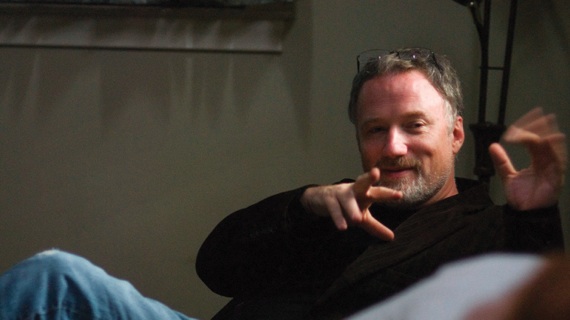
And there you have it. Hope you guys enjoyed the chat! Lots of good stuff in there and some frustrating stuff towards the end. I want The Goon movie so bad! With Gore Verbinski’s Rango kind of edging up from kiddie to that teen area that Mr. Fincher was talking about, I have to hope some brave studio will take the plunge on that movie sooner than later.
Now I prepare for 10 days in the freezing movie mecca of the Sundance Film Festival! Look for the big preview piece to hit very soon!
-Quint
quint@aintitcool.com
Follow Me On Twitter

